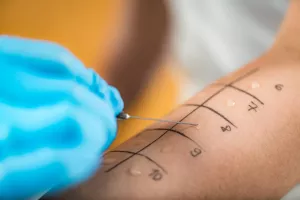Did you know that skin is the body’s largest organ and can be the key to learning more about your unique allergy triggers? Skin testing usually takes two forms: percutaneous (skin pricks) or intradermal (under the skin) allergy testing.
Pinpoint your unique allergy triggers
Skin prick testing, also called a puncture or scratch test, focuses on the surface of your skin. Meanwhile, intradermal testing goes just beneath the skin—but not too deep since your skin is roughly 2 millimeters thick, or about the thickness of a nickel.
No matter the skin testing your doctor recommends you can rest assured that you’re in safe hands at Tufts Medicine.

Treatments
Our team of allergists will test you for different kinds of allergens to ensure we’re covering all our bases. If your body doesn’t react to an allergen, that means your body isn’t sensitive to it.
Skin prick testing involves super tiny punctures on the surface of your skin. Each prick contains a small dose of allergen extracts, such as pollen, animal dander and insect venoms.
The dose is so small that people rarely have severe reactions to skin testing. On the other hand, your skin may become very itchy. No worries there—we can treat it with a topical antihistamine or an antihistamine pill if needed.
A small, itchy and red bump will pop up at the site of that skin prick within 15 minutes. If your doctor is testing you for common airborne allergens, they’ll make roughly 30 small punctures on your arm. We measure the reaction to the skin in 15 – 20 minutes.
If the prick test is negative, then your doctor may decide to do slightly stronger tests to be completely sure that you don’t have a sensitivity to the allergen.
The process for intradermal testing is very similar to the skin prick test. The main difference is that we inject a very tiny dose of the allergen extract directly beneath your skin.

From regular office visits to inpatient stays, find the healthcare you need and deserve close to home.

Meet the doctors and care team devoted to supporting you every step of the way along your path to better health.